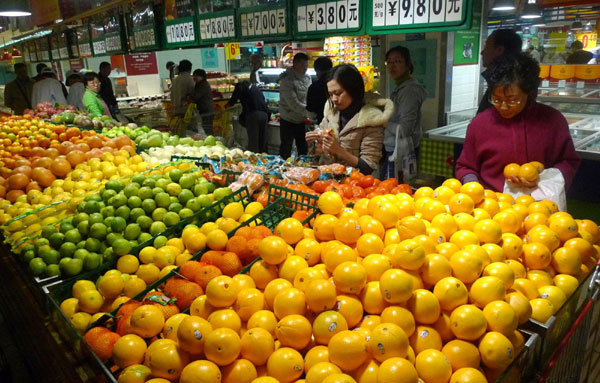Statistics
China's Nov CPI up 5.1%, a 28-month high
(Xinhua)
Updated: 2010-12-11 10:25
 |
Large Medium Small |
BEIJING - China's consumer price index (CPI), a major gauge of inflation, rose to a 28-month high of 5.1 percent in November, the National Bureau of Statistics (NBS) said Saturday.
The growth rate picked up from 4.4 percent in October, according to the NBS. The inflation was driven by a 11.7 percent of surge in food prices, which accounts for one third of the basket of goods used to calculate China's CPI.
|
 People buy fruits in a supermarket in Shanghai Dec 11, 2010. [Photo/Xinhua] |
The year-on-year increase in food prices grew from rises of 10.1 percent in October, 8 percent in September and 7.5 percent in August.
NBS spokesman Sheng Laiyun said the rise in food prices contributed 74 percent to November's CPI.
From January to November, China's CPI rose 3.2 percent year on year, surpassing the government's target ceiling of 3 percent for the year.
The producer price index (PPI) for China's industrial products rose 6.1 percent year on year in November, compared with a 5.0 percent gain in October.
Rising prices have propelled the government to take measures to rein in rising prices, including boosting supplies of key goods, giving financial aid to the needy and mopping up excessive liquidity. Economists have blamed liquidity as the major factor pushing up prices.
The central bank on Friday ordered banks to raise the amount of money they must keep in reserve for the sixth time this year, after it announced in October the first interest rates hike in nearly three years.
The move came after the central bank said earlier Friday that the new yuan loans in November stood at 564 billion yuan ($84.7 billion). The figure added up to a total of 7.45 trillion yuan of new loans in the first 11 months of the year, just shy of the government's 7.5-trillion-yuan full-year target.
In another step to cool prices, the State Council, or the Cabinet, on Friday imposed harsher penalties on Chinese vendors who collude to fix prices. They will face fines of up to 5 million yuan under new penalties, overturning the previous 1-million-yuan maximum fine for collusion to manipulate prices.
The Chinese Academy of Social Sciences, a government think tank, said in a report released Tuesday inflationary pressures are building and excess liquidity will be a major factor driving the CPI higher over the next several years.
It forecasts consumer prices to rise 3.2 percent over the full year in 2010.
Liu Yuanchun, professor with the Beijing-based Renmin University of China, said the November's CPI might be the peak of the year. He forecast inflation would stand at 4 percent for 2011.



